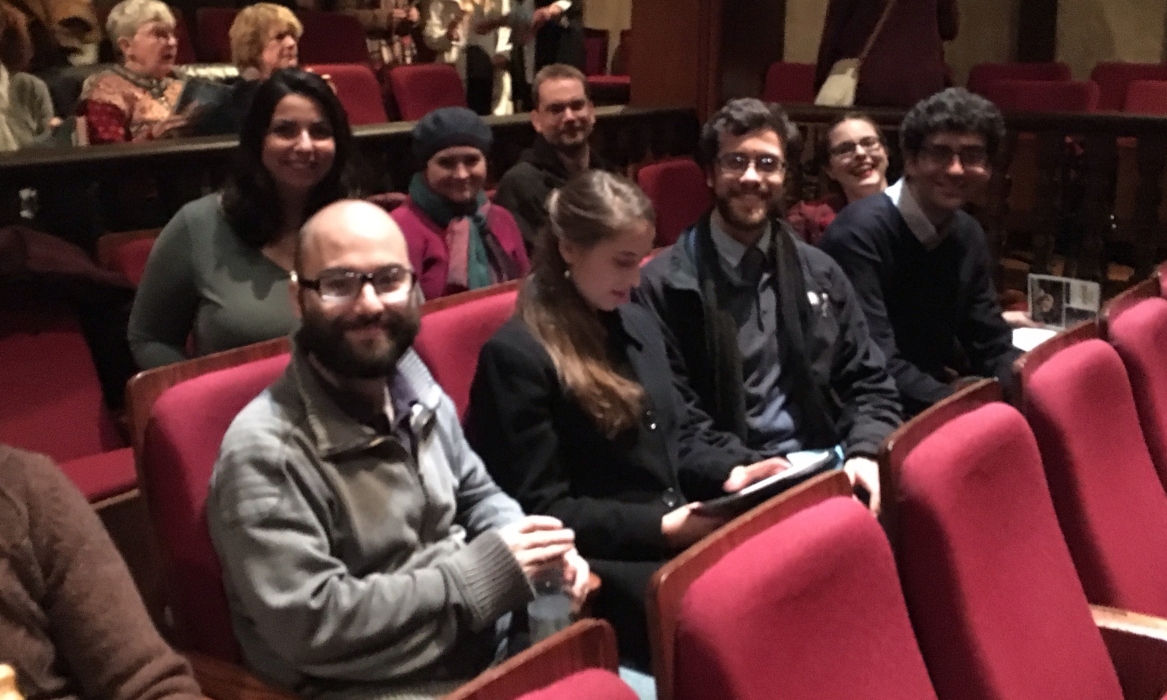
"How to be Alone Together: Community as a Research Method?"
By Jonathan Wanner (current Ph.D. student)
Literary research is a skyscraper of an endeavor: the constant climb up flights of poetic knowledge, the incessant construction of your thesis’ next floor. For English graduate students especially, constructing that first high-rise – the dissertation – can be daunting. The higher the scaffolds of the argument stretches, the more precise the construction tools must be: the drills and saws of generalities must give way to the picks and files of more refined terms, and always the sledge hammer leans ready to tear down the walls when the premise is not sound. Now the surgical maneuvering of grammar; now the grunt work of spading at evidence; again the tape measure. Your supervisor at your side, you never labor alone, but it feels that way when casting your eyes to the skyline you notice your peers, each in his or her separate tower adjusting screws. Upon further squint, what was distant before becomes near. In the twitch of a wink you realize you are surrounded by the unstinted sprawl of scholarly citadels: the monuments of academia at large. Suddenly the height of your thesis starts to shrink. You are now a gadfly, and your skyscraper a dollhouse. What to do? You cannot hike up every tower, and there is no easy elevator. So many books to read, so many questions to ask; so little time, so few answers. You would be lucky if you had time to survey the nuts and bolts of one of your colleagues’ projects, let alone compare them to yours. Loneliness. Then fear. Then doubt. Not quite the cup of tea you had planned to steep yourself in.
Research anxiety of this sort is pandemic, and the most direct solution – spend more effort building your dissertation higher – is not always the most effective one. More effort unfortunately does not always amount to better results. That fan at the rock concert who puts more effort into strained yells only loses her voice all the sooner; that carpenter who puts more effort into sloppily lifting logs hurts his back years before he otherwise would; and that artist who fails to treat his paper before he watercolors can try all he might, but the result will undoubtedly be a warped one. In each of these instances, the effort is vain precisely because the doer relies on a poor method. If the fan were to shout with proper breath support from the diaphragm, she would preserve her voice; if the carpenter were to lift the logs with his legs rather than his back, he would avoid a visit to the doctor; and if the artist were to soak, stretch, and tape his paper, it would not warp. So too with literary research. Working harder will only yield better results if critics ask the right questions, consult the right resources, dig their fingers into the grit of particular words and historical evidence, and logically connect that evidence to their conclusions.
There is, as well, an often forgotten step to the research process: (non-academic) community. Though seemingly counterintuitive, the climb upwards requires us at times to descend the stairs: to step out of the skyscraper and into the marketplace. To build up your research, you must first build up yourself by setting aside time for non-academic leisure with friends, with colleagues. While community may not always give critics the precise screws they need to finish their thesis’ next wall, it offers the human things: shared occasions of love, humor, joy, and compassion, the mingling of desire and fear, the momentary reflection on goals not your own. These are the things which help us hammer forward with zeal, humility, patience. Community outside of academia is not a distraction from knowledge: it is a proper part of the research method, and one which extends even beyond our own pursuits…
For the English Graduate Organization, our marketplace is the Marist Annex. Here is where we stretch our limbs out of our shells, where we unturtle our hearts, where daily we “dehermit” our minds. Out of these windows we watch mockingbirds row their milk-swatched wings; on this porch we rock stories out of the cradles of our mouth; on this table our feast opens mouths to bread, throats to wine, eyes to eyes. These faces so individual we can count them, so actual our eyes can contain them, are what keep our heels below the tree line. From this our vantage point below, we might look up at our towers and see our handiwork from the outside in, so that re-entering them, we might remember that to scrape the sky we must first lay mortar on the ground.
Photo: English graduate students attending a performance of King John at the Folger Theatre.
